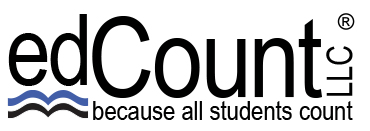Firm to Work with National Center on Educational Outcomes as Member of New National Center and State Collaborative Partnership
Washington, D.C. – edCount, LLC, a research firm dedicated to supporting policy development, program evaluations and assessments, announced today that it has contracted with the National Center on Educational Outcomes (NCEO) at the University of Minnesota to help form the National Center and State Collaborative Partnership (NCSC).
NCEO was awarded $45 million from the U.S. Department of Education to develop a new generation of alternate assessments for students with the most significant cognitive disabilities. The partnership will be a collaborative network of national centers and 19 states.
In addition to edCount, the organizations participating with NCEO, the host and fiscal agent for the effort, are the National Center for the Improvement of Educational Assessment (NCIEA), the University of Kentucky (UKY) and the University of North Carolina, Charlotte (UNCC).
The 19 state partners engaged in the work are: Alaska, Arizona, Connecticut, District of Columbia, Florida, Georgia, Indiana, Louisiana, Massachusetts, Nevada, New York, North Dakota, Pacific Assessment Consortium (PAC-6)*, Pennsylvania, Rhode Island, South Carolina, South Dakota, Tennessee, and Wyoming. These states together have 90,000 students with significant cognitive disabilities in grades 3-8 and high school, the targeted grades for this partnership.
NCSC is building a comprehensive assessment system that includes project-developed products and processes to support educators as they plan for and provide instruction that addresses common standards. These supports will help Individualized Education Program (IEP) teams accurately identify the learner characteristics of students with the most significant cognitive disabilities and will help them make appropriate decisions about how each student participates in the overall system of assessments.
The new NCSC, located at the University of Minnesota, is one of two programs funded by the U.S. Department of Education. The University of Kansas received the second award to work with 11 other states. The two programs will share knowledge as they implement their goals. They will also work in partnership with two assessment consortia of 44 states that are developing common general assessments through funding from the U.S. Department of Education in its Race to the Top Assessment Program. The Department’s Office of Special Education Programs (OSEP) administers the award.
Alternate Assessments Based on Alternate Achievement Standards
The NCSC partnership is focused on alternate assessments based on alternate achievement standards (AA-AAS). Alternate assessments are used to evaluate the performance of students who are unable to participate in general state assessments even with accommodations. Alternate assessments provide a mechanism for students with the most significant cognitive disabilities to be included in an educational accountability system. They are based on the grade-level content covered by the general assessment.
Benefits of NCSC to States
The cost per pupil of administering an AA-AAS has been reported at $250, $375, $575, and even as much as $2,500 per student. By collaboratively developing a multi-state assessment system, it is expected that such costs incurred by states can be substantially contained once the system is developed, especially in states with very few students being tested.
As Thurlow notes, “When our work is complete, the system will be available to all states, regardless of their participation in the initial development funded by this grant. The ultimate purpose is to provide states with a full set of assessments, curriculum and instructional supports, and professional development tools to implement a research-based, systemic approach to improving academic outcomes for students with the most significant cognitive disabilities.”
Benefits of NCSC to Students
There is great potential for the NCSC to improve outcomes for students with the most significant cognitive disabilities. These students have in the past been taught a separate curriculum from their peers, often in separate settings. Since a refocus of special education funding requirements on the same general curriculum for all students over a decade ago, all students with disabilities must be participating and making progress in a curriculum based on the same academic content standards defined for all students, content that is age-appropriate, engaging, and challenging. These changes have been controversial. Some are concerned that academic instruction will eliminate time for teaching important functional life-skills, like self-care and social skills. Others are concerned about the technical quality of assessments for such a highly varied group of students, since students with the most significant cognitive disabilities may learn and show what they know in different ways from their classmates, through assistive technology, pictures, symbols or textures, for example.
Quenemoen responds to these concerns saying, “Very early on in this work, we found startling evidence that students with the most significant cognitive disabilities were able to master and apply in meaningful ways the academic skills and knowledge that we never before had tried to teach them. We also know that development of new academic assessments cannot ensure improved outcomes for students without other high quality educational practices in place. That is why our project will develop not only a system of assessments to accurately reflect what the students have learned, but we will also build an integrated system of curriculum and instructional materials and intensive professional development and support to build capacity in our schools to teach these students well.”
* The PAC-6 entities are American Samoa, Commonwealth of the Northern Mariana Islands (CNMI), Federated States of Micronesia (FSM), Guam, Palau, and the Republic of the Marshall Islands (RMI).
About edCount
edCount is a woman-owned professional services firm providing education consulting services to federal, state, district, and school clients centered around instructional systems and capacity building, assessment implementation and evaluation, and policy evaluation and support. For more information, please visit www.edcount.com.
